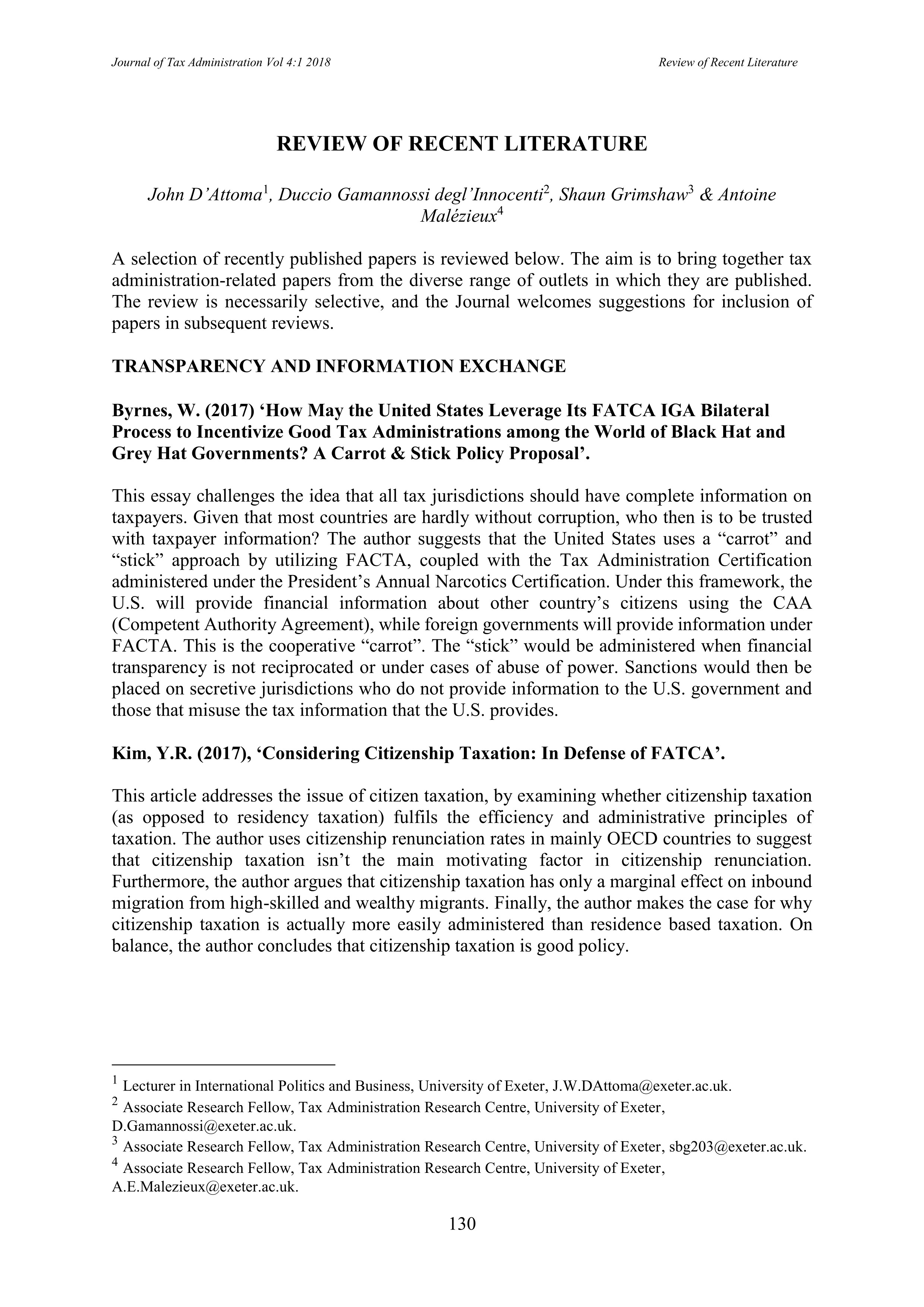Review of Recent Literature
Keywords:
Transparency and Information Exchange, Tax Profession, Tax Expenditures, Confidentiality, Tax Compliance: Individuals, Tax Compliance: Large Business, Dispute Resolution, BEPSReferences
Avi Yonah, R. & Xu, H. (2017) Evaluating BEPS, Erasmus Law Review, 10(1), 3-11
Byrnes, W. (2017) ‘How May the United States Leverage Its FATCA IGA Bilateral Process to Incentivize Good Tax Administrations among the World of Black Hat and Grey Hat Governments? A Carrot & Stick Policy Proposal’, Emory International Law Review, 31, 1033 - 1049.
Kim, Y.R. (2017), ‘Considering Citizenship Taxation: In Defense of FATCA’, Florida Tax Review, 20 (5), 335-370.
Cockfield, A. J. (2017) How Countries Should Share Tax Information, Vanderbilt Journal of Transnational Law, 50(5), 1091-1132.
Lankhorst, P. and van Dam, H. (2017) ‘Post-BEPS Tax Advisory and Tax Structuring from a Tax Practitioner’s View’, Erasmus Law Review, 10, 60.
Field, H. M. (2017). Aggressive Tax Planning & the Ethical Tax Lawyer. Virginia Tax Review, 36 (26), 261-321
Gammie, M. (2017) Shooting the messenger: the proposed enabler penalty, British Tax Review, 142-
West, A. (2017) Multinational Tax Avoidance: Virtue Ethics and the Role of Accountants, Journal of Business Ethics
Zu, Y. (2017) ‘Reforming VAT Concessions: A Tax Expenditure Analysis’, British Tax Review, 418 - 437.
Yin, G. K. (2017) ‘Congressional Authority to Obtain and Release Tax Returns’, Tax Notes 154(8) 1013 - 1015.
Debelva, F & Mosquera, I. (2017). Privacy and Confidentiality in Exchange of Information Procedures: Some Uncertainties, Many Issues, but Few Solutions. Intertax, 45 (5), 362- 381
Hambre, A-M. (2017). Tax Confidentiality: A Legislative Proposal at National Level. World Tax Journal, 9 (2), 1-14
Malik, S., Mihm, B. and Timme, F. ‘An Experimental Analysis of Tax Avoidance Policies’, International Tax and Public Finance, 25.1 (2018), 200–239.
Hallsworth, M., List, J. A., Metcalfe, R. D. & Vlaev, I. (2017). The behavioralist as tax collector: Using natural field experiments to enhance tax compliance. Journal of Public Economics, 148, 14-31.
Bruner D. M., D’Attoma, J. & Steinmo, S. (2017). The role of gender in the provision of public goods through tax compliance. Journal of Behavioural and Experimental Economics. 71, 45-55.
D’Attoma, J. (2018) What explains the North–South divide in Italian tax compliance? An experimental analysis, Acta Politica
Mendoza, J.P., Wielhouwer, J.L., & Kirchler, E (2017) The backfiring effect of auditing on tax compliance, Journal of Economic Psychology, 62, 284-294.
Alm, J. Bloomquist, K & Mckee, M (2017) When You Know Your Neighbour Pays Taxes: Information, Peer Effects and Tax Compliance, Fiscal Studies 38(4) 587 – 613.
Goerke, L. (2016) Tax evasion in a Cournot oligopoly with endogenous entry, International Tax and Public Finance,
De Widt, D. & Oats, L. (2017) Risk Assessment in a Co-operative Compliance Context: A Dutch-UK Comparison, British Tax Review, 230 –
Szudoczky, R & Majdanska, A. (2017) Designing Co-operative Compliance Programmes: Lessons from the EU State Aid Rules for Tax Administrations, British Tax Review, 204 –
De Carolis, D. (2017) A New Approach to International Dispute Resolution Processes, Intertax, 45(5) 391 – 401.
Ginevra, G. (2017) The EU Anti-Tax Avoidance Directive and the Base Erosion and Profit Shifting (BEPS) Action Plan: Necessity and Adequacy of the Measures at EU level, Intertax 45(2) 120 – 137.
Christians, A. (2017) BEPS and the New International Tax Order, Brigham Young University Law Review, 2603 – 1647.
Büttner T. and Thiemann, M. (2017)., ‘Breaking Regime Stability? The Politicization of Expertise in the OECD/G20 Process on BEPS and the Potential Transformation of International Taxation’, Accounting, Economics, and Law: A Convivium, 7.1

Downloads
Published
How to Cite
Issue
Section
License
Copyright (c) 2018 John D'Attoma, Duccio Gamannossi degl’Innocenti, Shaun Grimshaw, Antoine Malézieux

This work is licensed under a Creative Commons Attribution 4.0 International License.
Our open access status means that authors retain the copyright of their work. However, all papers published in JOTA are done so under a Creative Commons Attribution 4.0 International license (CC BY). This means that others can share and/or adapt your work without your permission as long as they follow certain rules, including attributing your work correctly.
You can learn more about this on our Open Access, Licensing, and Copyright Policies page.



